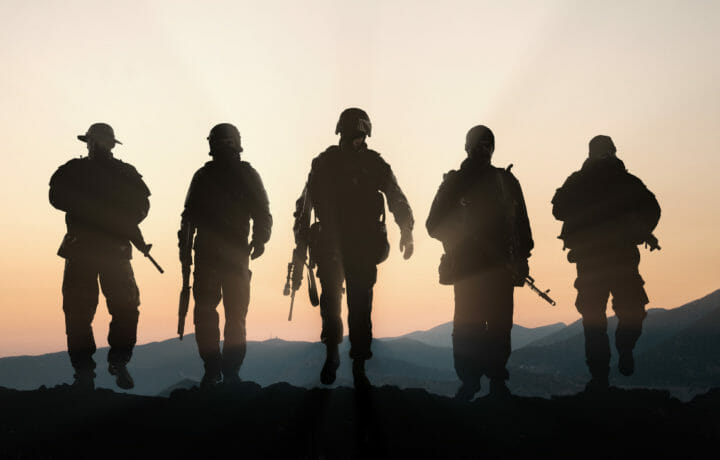During part of my tour in Afghanistan, I worked in the transportation cell for my task force, and there was an Air Force guy on the team who hated it there. Not the work, exactly (whatever his work was—it was never quite clear to me, though it must have involved watching hundreds of bootleg movies bought from the various bazaars), nor the accommodations, which were great for him -he never left the chair at his desk. No, what made his tour utterly unbearable was that one building over, there was a civilian working for a contractor doing the exact same job as him, but making hundreds of thousands of dollars per year, and not even having to wear that embarrassing Air Force tiger stripe camouflage pattern every day.
He wasn’t the only one who made similar such comments. From kitted-out security guys, to cooks, to air crew, every service member in-country had a civilian counterpart in the government contracting world who worked six months a year but made money in the multiple hundred-k’s, and, if rumor was correct, did so tax-free.
Almost 20 years since my deployment, I’m sure a lot has changed. Still, I wondered. In 2023, with virtually no American military presence in places like Iraq or Afghanistan, an ongoing proxy war in Ukraine, and who knows what happening in Africa, what do military contractors do when overseas on assignment? What sort of jobs are there, and what does it take to get them?
NO WEAPONS, NO GUARD DUTY (USUALLY)
To answer these questions and more, I spoke with Kervin Aucoin, owner of the private intelligence company Aucoin Analytics, and the producer and co-host of “This Week Explained,” a podcast focusing on geopolitics. Aucoin has experience with multiple contracting companies. From 2008 to 2018, he went on multiple deployments as a government contractor in the intelligence field, and worked alongside many different security contractors.
“My work was relegated to an office on a Forward Operating Base,” he told me. “While I moved from base to base, I did not carry a weapon and was not a security guard.” While deployed, he explained that the forward operating bases in Iraq and Afghanistan were pretty sweet digs, and had more amenities than some U.S. military bases. Being a contractor in a warzone had its dangers, he said, but there were very few times while there that he felt as if his life was in danger.
Though Aucoin never carried a weapon, some jobs there—ranging from OCONUS bodyguard to security officer—do, in fact, require you to be armed, and will need to be aware of that, and comfortable with that fact, before accepting a position.
WHAT A JOBSEEKER IN THE CONTRACTING SPACE SHOULD EXPECT
While risk to life and limb was not necessarily worrisome to Aucoin, there are several things a jobseeker interested in doing that sort of work should know before they apply for one of the many job openings. (To find them, check out the ClearanceJobs database of more than 67,000 contracting and full-time jobs for those who hold—or could get—a security clearance.)
“The days and nights are long,” said Aucoin flatly. “You will never get that time back with family, and you will be put in some of the most stressful situations of your life.” With that, however, comes “some of the most rewarding experiences, when you understand you are not only protecting the people of the United States, but you are protecting those most vulnerable in the country that you are deployed to.”
THE PAPER TRAIL THAT CONTRACTORS FOLLOW
To make it in the world of contracting, he said, you need to have your paperwork in order. Specifically—and this is something we have covered extensively at ClearanceJobs—you must be sure your clearance is up-to-date when applying. (Wondering how long your clearance is good for? Check this out. Is your clearance lapsed? Got you covered. If your new employer sponsors your clearance, can you immediately bail for a better offer? Yes indeed, with a catch.)
You need to fill out more than an SF-86 to be “paperwork-ready” for overseas contracting work, however. Aucoin says that you need to have all your medical paperwork updated, and much like a soldier about to head over, you to be checked out and cleared for deployment by a physician. “There is access to emergency services in most locations,” he said, “but otherwise, you will be on your own for medical treatment.” Best to get those cavities filled before you go.
IT IS NOT JUST FOR COMMANDOS
People have a general impression about contractors in the field that are not always consistent with reality. The biggest misconception people have about contractors doing this sort of work, Aucoin said, is that “all defense contractors are former special operative war profiteers.” Rather, just like in the military, the work available for contractors runs the gamut from security specialists to supply clerks.
“These specialized individuals give military personnel a break from the mundane everyday tasks and lets them focus on their mission and bring their brothers and sisters in arms home safely,” said Aucoin.
And word has it you’ll make a lot more money doing it, too.




